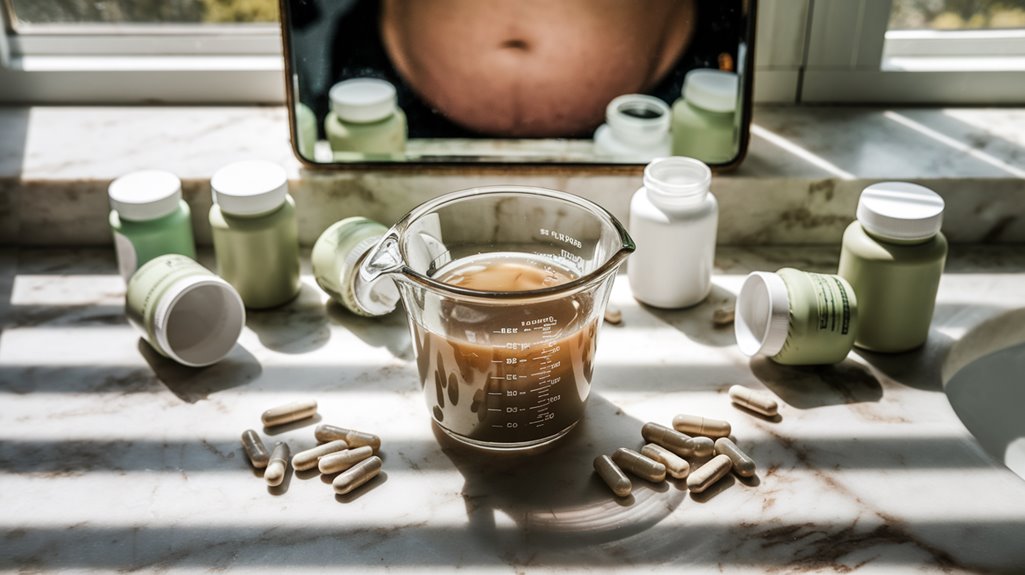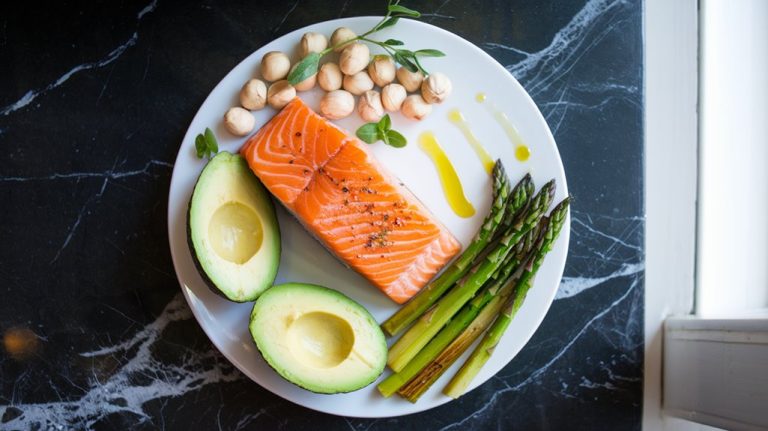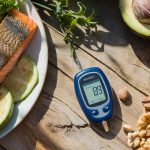Despite marketing claims, you don’t need special “keto detox” products or cleanses – your liver and kidneys already handle detoxification effectively. Initial rapid weight changes on keto are mainly water loss from glycogen depletion, not toxin elimination. While your gut microbiome does change during ketogenic adaptation, focusing on proper hydration, whole foods, and balanced nutrition will support your body’s natural processes. Understanding the science behind these changes reveals the truth about keto success.
Keto Highlights
- Keto “detox” products are unnecessary marketing gimmicks, as the body naturally detoxifies through the liver and kidneys without special cleanses.
- Initial rapid weight loss on keto is primarily water weight from glycogen depletion, not actual fat loss or detoxification.
- The gut microbiome changes significantly during keto adaptation, but “cleansing” products aren’t required for these natural bacterial shifts.
- Focusing on proper hydration, electrolytes, and fiber intake is more beneficial than detox supplements for gut health.
- Excessive focus on “detoxing” can lead to unhealthy practices and potential weight gain from calorie-dense “cleansing” products.
The Hard Truth About Keto “Detoxification”

While many companies market keto “detox” products as essential for starting a ketogenic diet, the truth is that your body doesn’t need special cleansing supplements to enter ketosis. Your liver and kidneys are already highly efficient at natural detoxification, making additional products unnecessary and potentially harmful.
You’ll want to ignore claims about needing to “cleanse” before starting keto. These products often cause more problems than they solve, including electrolyte imbalances, digestive issues, and unwanted interactions with medications. What you’re likely experiencing during your shift to keto is simply an adaptation period, commonly known as “keto flu.” Instead of reaching for expensive detox supplements, focus on gradually reducing carbohydrates while increasing your water and electrolyte intake. This evidence-based approach will help you navigate safely into ketosis.
Why Your Body Doesn’t Need a Keto Cleanse
Despite clever marketing claims about keto cleanses, your body already has a sophisticated detoxification system that operates 24/7. Your liver filters blood and neutralizes toxins, while your kidneys remove waste products. Your lungs expel harmful gases, and your skin eliminates toxins through sweat.
Starting a keto cleanse can actually interfere with these natural processes. The high fat intake stresses your liver, while the diet’s dehydrating effects can impair kidney function. You’re better off supporting your body’s built-in detox systems through proven methods: eating a balanced diet rich in fruits and vegetables, staying well-hydrated, exercising regularly, and getting enough sleep. These evidence-based approaches maintain your body’s natural cleansing abilities without risking the nutrient deficiencies, electrolyte imbalances, and digestive disruptions that often accompany trendy detox programs.
The Science Behind Ketosis vs. Detox Claims

While ketosis represents a scientifically-proven metabolic state where your body shifts to burning fat for fuel, detox diets make unsubstantiated claims about eliminating toxins that your body already handles naturally. Your liver, kidneys, and other organs effectively remove waste products and toxins without needing special cleanses or restrictive diets. The production of ketones through carbohydrate restriction has measurable physiological effects, but there’s no evidence that combining ketosis with detox protocols provides any additional benefits for toxin removal.
Ketones vs. Toxin Release
As ketogenic diets and detox cleanses gain popularity, it’s crucial to understand how ketones and toxin release actually interact in your body. While ketosis is a scientifically proven metabolic state where your liver produces ketones from fat, there’s no evidence supporting special “detox” effects from cleanses.
Your body naturally detoxifies through your liver and kidneys without needing special diets. However, when you rapidly lose weight on a ketogenic diet, you might experience increased toxin release as stored chemicals in fat cells are mobilized. The key difference is that ketones serve as legitimate fuel for your brain and body, while “detox” claims lack scientific backing. You’ll likely see weight loss on both approaches, but this comes from caloric restriction rather than any purifying effects.
Body’s Natural Detox Systems
The human body maintains a sophisticated network of organs and systems that continuously remove toxins and waste products – no special cleanses required. Your liver leads this process by converting harmful substances into water-soluble compounds while producing bile for fat digestion. Meanwhile, your kidneys filter blood and excrete waste through urine while regulating electrolyte balance.
Your digestive system’s microbiome breaks down toxins, while fiber helps bind and eliminate them through feces. The intestinal lining acts as a protective barrier against harmful substances. Your skin and lungs also play key roles – sweating helps eliminate toxins, while your lungs expel volatile compounds through breathing. Together, these systems work 24/7 to keep your body clean and functioning effectively, provided you’re supporting them with proper nutrition and hydration.
Understanding Weight Fluctuations on Keto
Starting a ketogenic diet often brings dramatic shifts in weight that can confuse or discourage newcomers. Your initial rapid weight loss mainly comes from water, as your body depletes glycogen stores, releasing 3-4 grams of water per gram of glycogen. With 450-800g of total body glycogen, you’ll notice significant water weight changes.
Daily weight can naturally fluctuate 5-6 pounds due to various factors like sodium intake, carbohydrate consumption, and hormonal changes. If you’re gaining weight on keto, you might be overconsumpting calorie-dense fats, underestimating carb intake, or neglecting portion control. To break through plateaus, you’ll need to reassess your macronutrient ratios, consider intermittent fasting, increase physical activity, and focus on nutrient-dense whole foods.
Gut Health Myths During Ketogenic Adaptation

While your gut microbiome undergoes significant changes during ketogenic adaptation, including shifts in bacterial populations and diversity, many assumptions about these changes aren’t supported by current research. You’ll likely experience temporary digestive adjustments as your body adapts to higher fat intake and reduced fiber, but these changes don’t necessarily indicate damage to gut health. Your focus should be on maintaining adequate fiber intake from keto-friendly sources and supporting your microbiome through the shift, rather than believing common myths about permanent gut disruption.
Microbiome Changes During Adaptation
As you begin a ketogenic diet, dramatic shifts occur in your gut microbiome within the first few days, marked by decreases in beneficial bacteria like Actinobacteria and Firmicutes. You’ll experience a significant reduction in Bifidobacteria species while seeing increases in Bacteroides and Parabacteroides associated with animal fat consumption.
The presence of ketone bodies directly influences these microbial changes, even independent of your macronutrient intake. These shifts affect your immune system, reducing Th17 cells and creating an anti-inflammatory gut environment. You’ll notice the most substantial changes during the first 2-4 weeks of adaptation, though individual responses vary based on factors like genetics and previous diet patterns. While some bacterial changes stabilize after 4-12 weeks, complete microbiome adaptation may take several months.
Fiber Loss Impacts Health
The dramatic reduction in fiber intake during ketogenic adaptation poses significant challenges to your gut health, with daily consumption often dropping below 15 grams compared to the recommended 25-30 grams. This deficit disrupts your gut microbiome‘s delicate balance, reducing beneficial bacteria like Bifidobacterium while potentially increasing harmful strains.
- Your gut’s protective mucus layer can erode, leading to increased intestinal permeability
- Beneficial bacteria lose their primary food source, decreasing short-chain fatty acid production
- Microbiome changes may become irreversible, even after reintroducing fiber later
You’ll need to actively maintain gut health through strategic fiber incorporation from keto-friendly sources like non-starchy vegetables. Consider supplementing with prebiotic fibers and gradually increasing intake to prevent digestive discomfort while supporting your gut bacteria population.
Inflammation Versus Ketone Effects
Despite popular concerns about ketogenic diets triggering inflammation, research reveals that ketone bodies – particularly β-hydroxybutyrate (βHB) – actually reduce inflammatory responses in your gut. βHB works by inhibiting NLRP3 inflammasome activation while decreasing pro-inflammatory markers like TNF-α and IL-6.
However, you’ll experience complex gut microbiome changes during ketosis. The diet alters bacterial populations, reducing Bifidobacteria while increasing Bacteroides and Parabacteroides. These shifts lead to decreased short-chain fatty acid production, which normally helps maintain your gut barrier and immune function. The good news? These microbial changes may offer therapeutic benefits for conditions like IBS, Crohn’s disease, and autoimmune disorders by reducing intestinal inflammation and T helper 17 cell activation through specific metabolites like indole lactic acid.
Common Misconceptions About Fat Loss and Detoxing
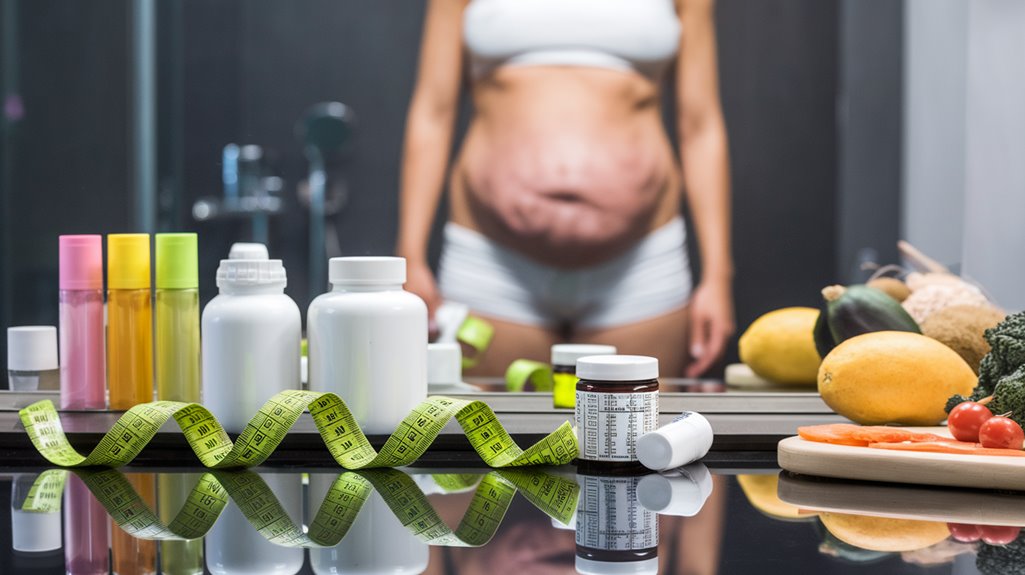
Many people fall prey to persistent myths about fat loss and detoxification, leading them to waste time and money on ineffective approaches. Your body already has sophisticated detoxification systems through your liver, kidneys, and skin. Research consistently shows that commercial detox programs and juice cleanses don’t deliver on their promises, often resulting in temporary water weight loss rather than actual fat reduction.
- Spot reduction of belly fat through targeted ab exercises isn’t possible – overall calorie deficit is required
- Carbohydrates aren’t the enemy – quality whole food carbs provide essential nutrients and fiber
- Detox diets and cleanses can disrupt your metabolism and gut microbiome while risking dehydration
Science proves that sustainable weight loss comes from balanced nutrition and regular exercise, not quick-fix cleanses or extreme restrictions that can harm your health.
Real Effects of Keto on Your Digestive System
While ketogenic diets have gained popularity for weight loss, their effects on digestive health extend far beyond simple calorie reduction. Your gut microbiome undergoes considerable changes, affecting 19 different bacterial genera and shifting the balance of key bacterial populations.
| Changes | Effects |
|---|---|
| Bacterial Composition | Reduces Bifidobacterium, alters Actinobacteria ratios |
| Gut Wall | Changes thickness and permeability |
| Inflammation | May increase or decrease depending on individual |
| Fiber Intake | Often decreases, affecting regularity |
| Ketone Production | Can suppress inflammation, benefit gut cells |
You’ll experience shifts in digestive function due to reduced fiber and increased dehydration risk. While some people with IBS or Crohn’s disease might find relief through ketosis, others may face complications. The diet’s impact on gut health varies greatly between individuals and requires careful monitoring for ideal results.
Separating Marketing Hype From Scientific Facts

Separating fact from fiction in the ketogenic diet landscape requires careful examination of scientific evidence versus marketing claims. While research shows legitimate benefits like improved blood sugar control and modest weight loss advantages, many commercial keto products overstate or misrepresent the scientific findings.
- Clinical studies confirm keto can reduce alcohol cravings and support short-term metabolic improvements
- Meta-analyses show only small weight loss benefits compared to other diets
- Long-term adherence remains challenging, with potential risks like nutrient deficiencies
You’ll need to weigh the evidence-based benefits against documented risks, including cellular senescence, altered gut microbiome, and possible heart disease risk from high fat intake. Your genetic factors and pre-existing conditions will influence how you respond, so consult healthcare providers before starting any ketogenic protocol.
The Role of Water Weight in Keto Results
You’ll notice dramatic initial weight loss on keto as your body sheds 6-10 pounds of water weight in the first two weeks, primarily due to glycogen depletion and increased urination. To measure true fat loss progress, you should track your weight after this initial water weight drop stabilizes, typically focusing on a sustainable loss of about 2 pounds per week. You can prevent dehydration during this process by maintaining proper electrolyte balance, especially monitoring your sodium-to-potassium ratio and staying well-hydrated.
Initial Fluid Loss Explained
The dramatic weight loss many people experience in their first week of keto – typically 2-10 pounds – comes primarily from water weight, not fat loss. When you restrict carbohydrates, your body depletes its glycogen stores, releasing bound water. Each gram of glycogen holds 2-3 grams of water, leading to significant fluid loss as you enter ketosis.
- Your body can shed 1-5 kg of total body water in the first 1-8 weeks
- This process occurs alongside salt loss and increased urination
- Your muscles may temporarily appear smaller due to water reduction
To manage this initial fluid loss, you’ll need to increase your water intake to about 10 glasses daily. This helps prevent dehydration from the ketones’ diuretic effect and minimizes keto flu symptoms as your body adapts to the new fuel source.
Measuring True Weight Changes
Accurately tracking fat loss versus water weight fluctuations remains essential for measuring true progress on a ketogenic diet. You’ll need to look beyond the bathroom scale, as daily weight can fluctuate 2-4 pounds from fluid and food intake alone.
For the most precise measurements, use blood ketone meters to confirm you’re in the ideal 1.5-3.0 mmol/L range for fat loss. DEXA scans provide the most accurate body composition analysis, while body fat calipers can track changes in subcutaneous fat between scans. Remember that sustainable fat loss typically occurs at 1-2 pounds per week after your initial water weight drop of 6-10 pounds. To distinguish true fat loss from water retention, monitor your electrolyte balance and watch for hidden carbs or excess protein that could trigger water retention through gluconeogenesis.
Preventing Dehydration Effects
Understanding water weight fluctuations becomes a key factor in achieving long-term success on a ketogenic diet. You’ll initially lose 6-10 pounds of water weight as your glycogen stores deplete, but this dramatic drop isn’t fat loss. Your body requires proper hydration strategies to maintain healthy kidney function and prevent common side effects.
- Increase your daily water intake and aim for 3-5 grams of sodium to maintain electrolyte balance
- Monitor your urine color – pale yellow indicates proper hydration levels
- Include potassium-rich foods like kale, avocados, and broccoli in your meals
Watch for dehydration warning signs including excessive thirst, dry mouth, fatigue, and headaches. Your body will eventually adapt to its new water balance, but you’ll need to maintain consistent hydration habits throughout your keto journey to support sustained weight loss and prevent electrolyte imbalances.
Hidden Risks of Extreme Low-Carb Cleansing
While extreme low-carb cleanses may promise quick results, research reveals serious hidden health risks that you should carefully consider. Studies show a 32% higher risk of premature death and a 51% increased risk of coronary heart disease on low-carb diets. You’re also facing a 35% higher cancer mortality risk and significant cognitive challenges from insufficient glucose supply to your brain.
Beyond mortality risks, you’ll likely experience nutrient deficiencies, electrolyte imbalances, and metabolic slowdown. Your body may struggle with kidney stress from excess protein, while reduced fiber intake can disrupt your gut microbiome and digestion. You might also face mood swings, brain fog, and potential social isolation due to strict dietary restrictions. These effects can compound over time, leading to long-term health complications including kidney stones and bone health issues.
Why Your Liver Already Does the Detox Work
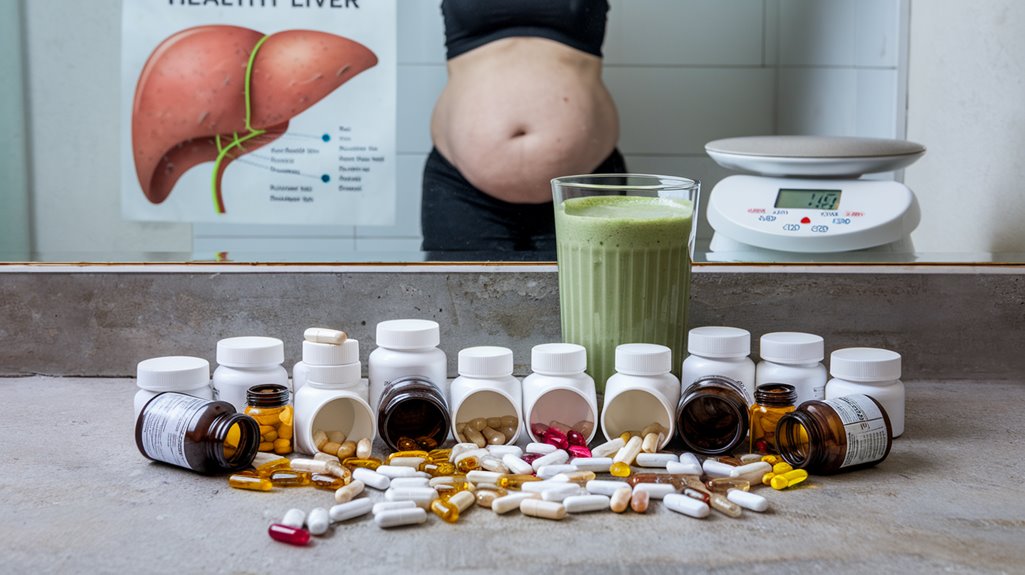
Your liver operates as a sophisticated natural detoxification powerhouse, utilizing a two-phase system that efficiently processes toxins 24/7. Through cytochrome P450 enzymes and conjugation reactions, your liver transforms fat-soluble toxins into water-soluble compounds for elimination, no special cleanses required.
- Your body produces glutathione, the liver’s primary antioxidant, while B vitamins and amino acids support natural detoxification phases
- Regular exercise, adequate sleep, and proper hydration enhance your liver’s innate cleansing abilities
- Common detox products and extreme diets can actually stress your liver rather than help it
Instead of falling for unproven cleansing products, focus on supporting your liver’s built-in detox mechanisms through balanced nutrition and healthy lifestyle choices. Scientific evidence shows your liver doesn’t need special interventions to perform its cleansing function effectively.
Smart Strategies for Healthy Ketogenic Living
Supporting natural liver function is important, but achieving ideal health through ketosis requires strategic planning and implementation. You’ll need to maintain proper macronutrient ratios of 70-80% fat, 10-20% protein, and 5-10% carbs while ensuring adequate hydration and electrolyte balance.
Focus on meal preparation with whole foods like vegetables, quality meats, fish, and nuts. You’ll want to combine this with regular exercise, including both cardio and strength training, while getting 7-9 hours of sleep nightly. Track your progress beyond just weight, measuring energy levels and body composition changes.
For long-term success, join keto support groups, educate your social circle, and plan ahead for special occasions. Consider cyclical or targeted keto approaches if needed, and regularly reassess your goals to maintain sustainable progress.
Frequently Asked Questions
Can Keto Diet Supplements Speed up the Detoxification Process?
You won’t speed up detoxification with keto supplements, as there’s no scientific evidence supporting this claim. Your body naturally detoxifies through your liver and kidneys without supplement intervention.
How Long Should I Wait Between Keto Cycles for Optimal Results?
You’ll want to wait 2-3 weeks minimum between keto cycles to maintain fat adaptation, but don’t exceed 4-6 weeks. Adjust timing based on your exercise routine and body’s response.
Does Exercising During Keto Cleanse Increase Toxin Elimination Through Sweat?
You won’t eliminate significant toxins through sweat during keto exercise. While sweating helps regulate temperature, your liver, kidneys, and intestines handle most detoxification, regardless of your diet or exercise routine.
Will Adding Intermittent Fasting Enhance Keto Detox Benefits?
You’ll enhance detoxification by combining intermittent fasting with keto, as this duo amplifies autophagy, improves metabolic flexibility, and supports your body’s natural cleansing processes through enhanced fat metabolism.
Can Certain Herbs or Spices Boost Ketone Production While Cleansing?
Powerful pairings produce results: You’ll boost ketone levels and gut health with cinnamon for blood sugar control, turmeric-black pepper for fat burning, and ginger-garlic for digestive support and metabolism enhancement.
Conclusion
Your body’s natural detoxification system already handles the heavy lifting – no trendy keto cleanses required. While you might see initial water weight changes, don’t confuse temporary fluctuations with true fat loss. Instead of chasing quick fixes, focus on sustainable ketogenic eating that supports your liver’s built-in detox processes. Trust the science: clean keto nutrition trumps extreme detox protocols for lasting health and weight management results.
References
- https://eatpropergood.com/blogs/a-proper-good-blog/keto-cleanse
- https://jackkruse.com/my-leptin-prescription/
- https://nutritionsource.hsph.harvard.edu/healthy-weight/diet-reviews/ketogenic-diet/
- https://www.brafton.com/blog/creation/blog-post-ideas/
- https://my.clevelandclinic.org/health/articles/24003-ketosis
- https://backlinko.com/content-study
- https://www.healthline.com/nutrition/ketogenic-diet-101
- https://www.medicalnewstoday.com/articles/323544
- https://www.nm.org/healthbeat/healthy-tips/nutrition/pros-and-cons-of-ketogenic-diet
- https://www.kumc.edu/about/news/news-archive/keto-diet-research.html
- https://www.science.org/doi/10.1126/sciadv.abf6780
- https://med.stanford.edu/news/all-news/2024/04/keto-diet-mental-illness.html
- https://www.lingexp.uni-tuebingen.de/z2/Morphology/baroni.rows
- https://www.frontiersin.org/journals/nutrition/articles/10.3389/fnut.2024.1254341/full
- https://www.science.org/content/article/keto-diet-may-cause-organ-damage-mouse-study-finds
- http://mit.edu/~ecprice/Public/freq/googlelist.counts
- https://www.ncbi.nlm.nih.gov/books/NBK499830/
- https://www.health.harvard.edu/blog/ketogenic-diet-is-the-ultimate-low-carb-diet-good-for-you-2017072712089
- https://www.forksoverknives.com/wellness/new-study-links-keto-diet-to-severe-long-term-health-risks/
- https://orthointegrative.com/blog/keto-diet-help-detox/

